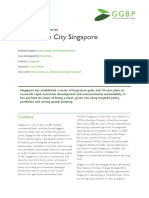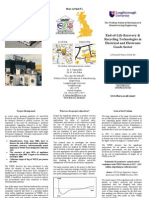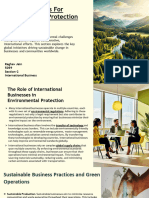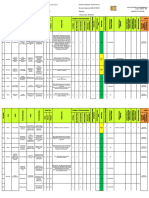cgpp4 9 Cit - Summary
cgpp4 9 Cit - Summary
Uploaded by
api-286562658Copyright:
Available Formats
cgpp4 9 Cit - Summary
cgpp4 9 Cit - Summary
Uploaded by
api-286562658Original Title
Copyright
Available Formats
Share this document
Did you find this document useful?
Is this content inappropriate?
Copyright:
Available Formats
cgpp4 9 Cit - Summary
cgpp4 9 Cit - Summary
Uploaded by
api-286562658Copyright:
Available Formats
At a Glance
Cork Institute of Technology established
a Sustainable Campus Programme at its
Bishopstown campus. It is an integrated
programme involving all areas of
sustainability from energy and water
consumption to solid waste and
resource use, as well as environmental
awareness raising. The programme
involved baseline auditing, installation
of appropriate monitoring equipment,
prevention opportunity assessment,
options generation and projects
implementation and monitoring.
Some Key results
The programme is significantly
raising awareness on campus;
Solid waste generation was reduced
by 12% per student and recovery
rate was increased by 17%,
following the installation of a new
recycling system across campus;
Electricity kWh usage per student
was reduced by 5.5% despite the
increase in activity, facilities and
buildings on campus;
Water consumption decreased by
almost 4%;
CO2 emissions generated from
electricity
consumption
were
reduced from 314 kg per student to
122 kg per student;
Paper usage was reduced by 4.6%
per student
Combined total savings of 458,582
since beginning of project.
Two Green Hospitality Awards
These
reductions
have
obvious
environmental and economic benefits
for the Institution and the local
community.
2008-CP-9-S2
CITs Sustainable Campus
Programme
It is an integrated programme involving
all areas of environmental management
from energy and water consumption to
solid waste and resource use, as well as
awareness raising. This successful
programme has a high level of
replicability, not just across all other
third-level Institutions, but all public
sector organisations.
Outcomes
Cork Institute of Technology
Rossa Avenue, Bishopstown, Cork
With over 12,000 registered students
and 1,544 staff, Cork Institute of
Technology (CIT) caters for both full and
part-time study as well as many evening
and weekend courses. CIT has expanded
rapidly over recent years, and now
encompasses a mix of new and older
buildings.
Aims of this project
The programme aims to significantly
raise environmental awareness in the
Institute among staff and students,
which will lead to long term
sustainability
on
campus.
The
programme aims to identify and
implement improvement options to
reduce energy, water, solid waste and
resource use at the campus, and to
disseminate the cleaner greener
production message to the broad
audience of staff and students.
Implementing a sustainable campus
programme will help ensure that long
term reductions result, leading to
continual improvement and sustainable
development.
Project Description
Since 2009 Cork Institute of Technology
has established a Sustainable Campus
Programme at its Bishopstown campus.
The programme is significantly raising
awareness on campus among the staff
and student body. These reductions
have obvious environmental and
economic benefits for the Institution
and the local community. The College
Canteen became the first third-level
canteen in Ireland to receive the Green
Hospitality Award and the Department
of Tourism & Hospitality received the
Gold level award. It is hoped that
Sustainability will be built into the daily
lives of students and staff at CIT. Total
economic savings of 458,582 (of which
353,885 were from more favourable
electricity rates from a new supplier)
and projected savings of 389,682 for
2011. The project will continue at CIT
after the funding from the EPAs CGPP
has ceased.
Picture1. The Department of Tourism &
Hospitality Studies receives the Gold
level Green Hospitality Award at the
2010 presentations held in Hayfield
Manor, Cork.
Recognition for the programme
Some of the key achievements of the
Sustainable Campus Programme in CIT
included the following:
A guide book How to Green Your Campus or
Workplace - A Step by Step Guide
(http://www.greencampuscit.ie/index.php?me
nu=&id=9&nid=86) was produced based on
the results of the programme and
disseminated widely across other third level
institutions, local authorities and other public
sector organisations.
Savings made
Implementation of separate food
waste bins well in advance of the
Food Waste Regulations (diverting 39
tonnes of food waste from landfill in
2010);
Reduction of solid waste by almost
8% despite the increase in student
numbers by 5%;
Increased recyclable recovery rate by
17%;
Campus BER rating improved by a full
grade from a D1 in 2009 to C1 in
2010;
A reduction of 1293 t CO2 emissions
(54%) to the atmosphere compared
to the previous year
Electricity bills were significantly
reduced (353,885)*
*Much of these savings were made by
switching to a different supplier with cheaper
rates.
Actions to produce savings
Many old inefficient lights were
replaced in corridors with energy
efficient fittings and sensors installed;
Student Centre lighting replaced 44 x
400W metal halide fittings with 22 x
90W and 22 x 30W frontline LED
fittings (saving 15,040 annually);
63 timers were fitted to heaters,
extraction and light fittings;
100 LED flood lights (90W) replaced the
old 400W flood lights around the campus;
CITs gas bills reduced by 36% with a
financial saving of 4624 in the first 3
months
Water flow rates in one building were
reduced by 80%
Achieving two Green Hospitality
Awards
Final stages in the Sustainable Energy
Awards 2010
Shortlisted for the Green Awards
2011
Green Campus CIT featured on the
RTE Eco-Eye.
Other activities
Waste awareness day was held;
Zero waste meal was prepared by the
students as part of the European
Week for Waste Reduction (EWWR)
events reducing waste generated by
35% of the industry norm;
Developing a new uniform recycling
system across campus;
Installation of an electronic vehicle
point on campus (1st in an Irish third
level organisation)
Academic activities
Introduction of a new sustainability
module for fourth year students at
CIT in Environmental Management.
Lessons
The programme has replicability, not just
across all other third level Institutions, but
all public sector organisations. Improving
sustainability of all aspects of our lives,
not
just
conventional
production
processes is important. All campuses
should endeavour to operate in the most
sustainable fashion possible and have the
opportunity to promulgate the message
widely.
Gaining support and commitment are the
first steps to a successful Sustainable
Campus Programme. Buy in from top
management is hugely important for a
successful programme. A sustainable
campus programme is an integrated
programme combining the involvement
and education of the student and staff
body to help reduce the consumption of
resources on campus.
More Information
For more information on this project
please contact:
Mary Purcell
Telephone: 353 (21) 4326100
Email: Mary.Purcell@cit.ie
The Cleaner Greener Production
Programme (CGPP) of the EPA is funded
under the National Development Plan 20072013. The CGPP was launched in 2001 as a
grant scheme to fund Irish organisations to
implement cleaner greener practices while
achieving significant cost savings.
Cleaner Greener Production is the
application of integrated preventive
environmental strategies to processes,
products and services to increase overall
efficiency and reduce risks to humans and
the environment.
Production processes: conserving raw
materials and energy, eliminating toxic
raw materials, and reducing the quantity
and toxicity of all emissions and wastes
Products: reducing negative impacts along
the life cycle of a product, from raw
materials extraction to its ultimate
disposal.
Services: incorporating environmental
concerns into designing and delivering
services.
The programme aims are focussed on
avoiding and preventing adverse
environmental impact rather than treating
or cleaning up afterwards. This approach
brings better economic and environmental
efficiency.
The CGPP is funded by the EPA STRIVE and
NWPP programmes this may be changed to
Be Green
Additional case studies from companies that
participated in CGPP are available on our
website (www.cleanerproduction.ie),
including:
A full technical report for each project
Programme brochures, summarising all
projects funded under CGPP
More information on CGPP is available from
the EPA:
Lisa Sheils
Environmental Protection Agency,
Richview, Clonskeagh,
Dublin 14, Ireland
Tel: +353 (0)1 2680100
http://www.epa.ie/researchandeducation/research
You might also like
- Introduction to Green Buildings & Built EnvironmentFrom EverandIntroduction to Green Buildings & Built EnvironmentNo ratings yet
- GGBP Case Study Series - Singapore - Sustainable City SingaporeDocument6 pagesGGBP Case Study Series - Singapore - Sustainable City SingaporeThilinaAbhayarathneNo ratings yet
- Seminar PPT (Sobi)Document29 pagesSeminar PPT (Sobi)nagma talib100% (1)
- At A Glance The Green Seafood Business Programme Project DescriptionDocument2 pagesAt A Glance The Green Seafood Business Programme Project Descriptionapi-286562658No ratings yet
- cgpp5 22 Cope Summary For WebDocument2 pagescgpp5 22 Cope Summary For Webapi-286562658No ratings yet
- cgpp4 15 SupermacsDocument2 pagescgpp4 15 Supermacsapi-286562658No ratings yet
- CGPP Phase 2 BrochureDocument32 pagesCGPP Phase 2 Brochureapi-286562658No ratings yet
- 2010 ET-CP-19 Logistics Optimisation and Energy Optimisation For Jack Cuthbert's BakeryDocument2 pages2010 ET-CP-19 Logistics Optimisation and Energy Optimisation For Jack Cuthbert's Bakeryapi-286562658No ratings yet
- cgpp2004 10 SummaryDocument4 pagescgpp2004 10 Summaryapi-286562658No ratings yet
- cgpp2004 20 SummaryDocument4 pagescgpp2004 20 Summaryapi-286562658No ratings yet
- UWS Carbon Management Plan 2010Document44 pagesUWS Carbon Management Plan 2010Chris FindlayNo ratings yet
- Facilities Directorate The University of Hull Energy and Water PolicyDocument3 pagesFacilities Directorate The University of Hull Energy and Water Policygerald077No ratings yet
- Waste Reduction Programme Focused On Process Technologies at Connacht Gold Dairy Ingredients (Shannonside) Project DescriptionDocument2 pagesWaste Reduction Programme Focused On Process Technologies at Connacht Gold Dairy Ingredients (Shannonside) Project Descriptionapi-286562658No ratings yet
- Sustainability Report 2013Document15 pagesSustainability Report 2013Pinky PutriNo ratings yet
- Scho1209brnz e e PDFDocument76 pagesScho1209brnz e e PDFmunawarNo ratings yet
- MED TEST - Tunisia: The Case StudiesDocument30 pagesMED TEST - Tunisia: The Case StudiestsakiriNo ratings yet
- Summer Sustainability: University of GreenwichDocument5 pagesSummer Sustainability: University of GreenwichOribuyaku DamiNo ratings yet
- MED TEST: Transfer of Environmental Sound Technology in The South Mediterranean Region - Egypt Case StudiesDocument26 pagesMED TEST: Transfer of Environmental Sound Technology in The South Mediterranean Region - Egypt Case StudiestsakiriNo ratings yet
- How Green Is Your BuildingDocument10 pagesHow Green Is Your BuildingmoriartybNo ratings yet
- Energy and Environmental Management: The School of The Built and Natural EnvironmentDocument2 pagesEnergy and Environmental Management: The School of The Built and Natural EnvironmentOlayiwola OmiyefaNo ratings yet
- MAY 2024 - SUMMARYDocument16 pagesMAY 2024 - SUMMARYperfect.rakhi.007No ratings yet
- Lankbank EnvironmentalDocument6 pagesLankbank EnvironmentalNikki M. ArapolNo ratings yet
- EG7037 Assignment 01Document7 pagesEG7037 Assignment 01Pavi ThranNo ratings yet
- 1758 Energy & Water ConservationDocument14 pages1758 Energy & Water Conservationsuvronilbhowmick522No ratings yet
- International Practices and Innovative Initiatives in Greening TVETDocument47 pagesInternational Practices and Innovative Initiatives in Greening TVEThanniemaelimonNo ratings yet
- EVS PROJECT DRAFTDocument15 pagesEVS PROJECT DRAFTmananberiaNo ratings yet
- 2018-2019 Sustainability Report - FINAL - WebDocument16 pages2018-2019 Sustainability Report - FINAL - WebRamgharia KaurNo ratings yet
- Lucky the Great, Impossible SolutionDocument12 pagesLucky the Great, Impossible Solutionsalambalucky29No ratings yet
- Feasibility Study Into A Gisborne Facility To Convert Waste Into EnergyDocument10 pagesFeasibility Study Into A Gisborne Facility To Convert Waste Into EnergyAnaya RantaNo ratings yet
- WEEE LeafletDocument2 pagesWEEE LeafletСергей БедняковNo ratings yet
- Building Planning and MassingDocument114 pagesBuilding Planning and MassingVineet VermaNo ratings yet
- Cleaner Greener Production Programme (cgpp4&5) Business Case Studies 2008-2012Document36 pagesCleaner Greener Production Programme (cgpp4&5) Business Case Studies 2008-2012api-286562658No ratings yet
- Green Campus ConceptDocument3 pagesGreen Campus Conceptchia setianiNo ratings yet
- Overview of Power Grid Corporation of India LimitedDocument2 pagesOverview of Power Grid Corporation of India Limitedayankhan1516No ratings yet
- Conserving EnergyDocument36 pagesConserving EnergyrahultalokarNo ratings yet
- Sustainable Report by UnmonaDocument9 pagesSustainable Report by UnmonaUnmona NeogNo ratings yet
- Leed Platinum BrochureDocument2 pagesLeed Platinum BrochureBharath Reddy ChinthiReddyNo ratings yet
- Programa LIFE Res Menes Breves de Los Proyectos Resultantes de La Convocatoria de Propuestas de 2021 de LIFE 2020Document36 pagesPrograma LIFE Res Menes Breves de Los Proyectos Resultantes de La Convocatoria de Propuestas de 2021 de LIFE 2020Abisme guiesNo ratings yet
- Sree Sastha Institute of Engineering and Technology: Green Audit ReportDocument11 pagesSree Sastha Institute of Engineering and Technology: Green Audit ReportCandida DhasonNo ratings yet
- Environmental Sustainability Strategy 2012-14Document13 pagesEnvironmental Sustainability Strategy 2012-14Glyndŵr UniversityNo ratings yet
- Sustainability and Emerging Green Technologies Are Crucial ForDocument15 pagesSustainability and Emerging Green Technologies Are Crucial ForYASIN CAFENo ratings yet
- Case Study Cambridge City Council: BackgroundDocument2 pagesCase Study Cambridge City Council: BackgroundpatriciojouiNo ratings yet
- Project Taj Hotels - HRMDocument21 pagesProject Taj Hotels - HRMHRM-9506 Siddhi ChavanNo ratings yet
- Integrating Environmental Sustainability Concerns in Agricultural Higher Education, Research and InnovationsDocument5 pagesIntegrating Environmental Sustainability Concerns in Agricultural Higher Education, Research and Innovationsvikramsinghmeena414No ratings yet
- Bsbsus501A Assessment 3 Sustainability Review-Sydney Opera House Student Name: Harpreet Singh Student ID: 10525Document10 pagesBsbsus501A Assessment 3 Sustainability Review-Sydney Opera House Student Name: Harpreet Singh Student ID: 10525Dark KnightNo ratings yet
- Topic 12 Green BuildingDocument16 pagesTopic 12 Green Buildinghaiqalhaziq69No ratings yet
- Ellen May Zanoria - Ensuring The Delivery of SustainabilityDocument15 pagesEllen May Zanoria - Ensuring The Delivery of SustainabilityAsia Clean Energy ForumNo ratings yet
- SustainabilityDocument15 pagesSustainabilityYASIN CAFENo ratings yet
- SDG AwardDocument6 pagesSDG AwardHornbill Networks ConsortiumNo ratings yet
- It Covers The Following Energy From Waste by Following TechnologiesDocument3 pagesIt Covers The Following Energy From Waste by Following Technologiesaghosh704No ratings yet
- Different Ways To Develop Green HousingDocument11 pagesDifferent Ways To Develop Green HousingMilda KlimanskyteNo ratings yet
- E Waste2Document9 pagesE Waste2aks264aksNo ratings yet
- International Business-2Document11 pagesInternational Business-2Ankit KumarNo ratings yet
- CGPP2004/2: Moving Towards A More Sustainable Fish IndustryDocument2 pagesCGPP2004/2: Moving Towards A More Sustainable Fish Industryapi-286562658No ratings yet
- Singapore NDCDocument3 pagesSingapore NDCray chi.No ratings yet
- OJEEpublishedjournalDocument14 pagesOJEEpublishedjournalNurfazlin Mohamad ZamriNo ratings yet
- Improvement of Skills in the Green Economy through the Advanced Training Programs on Cradle to CradleFrom EverandImprovement of Skills in the Green Economy through the Advanced Training Programs on Cradle to CradleNo ratings yet
- Clean Ironmaking and Steelmaking Processes: Efficient Technologies for Greenhouse Emissions AbatementFrom EverandClean Ironmaking and Steelmaking Processes: Efficient Technologies for Greenhouse Emissions AbatementNo ratings yet
- Better Business in A Better IrelandDocument4 pagesBetter Business in A Better Irelandapi-286562658No ratings yet
- Better Business in A Better Ireland: Cleaner Sugar Beet ProductionDocument4 pagesBetter Business in A Better Ireland: Cleaner Sugar Beet Productionapi-286562658No ratings yet
- 2 4Document2 pages2 4api-286562658No ratings yet
- Waste Reduction Programme Focused On Process Technologies at Connacht Gold Dairy Ingredients (Shannonside) Project DescriptionDocument2 pagesWaste Reduction Programme Focused On Process Technologies at Connacht Gold Dairy Ingredients (Shannonside) Project Descriptionapi-286562658No ratings yet
- CGPP2004/2: Moving Towards A More Sustainable Fish IndustryDocument2 pagesCGPP2004/2: Moving Towards A More Sustainable Fish Industryapi-286562658No ratings yet
- cgpp2004 26 SummaryDocument4 pagescgpp2004 26 Summaryapi-286562658No ratings yet
- Cleaner Greener Production Programme (cgpp4&5) Business Case Studies 2008-2012Document36 pagesCleaner Greener Production Programme (cgpp4&5) Business Case Studies 2008-2012api-286562658No ratings yet
- Better Business in A Better IrelandDocument4 pagesBetter Business in A Better Irelandapi-286562658No ratings yet
- cgpp2004 3 SummaryDocument4 pagescgpp2004 3 Summaryapi-286562658No ratings yet
- cgpp2004 25 SummaryDocument4 pagescgpp2004 25 Summaryapi-286562658No ratings yet
- Schiedel CGPP 2 15 SummaryDocument2 pagesSchiedel CGPP 2 15 Summaryapi-286562658No ratings yet
- CC 604, Environmental Pollution and Control Syllabus. Sem 5 Politeknik, JKADocument11 pagesCC 604, Environmental Pollution and Control Syllabus. Sem 5 Politeknik, JKAmuhdakmaladnan0% (2)
- deso01 (1)Document3 pagesdeso01 (1)vihtt208No ratings yet
- Allahabad SWM-Policy-EngDocument30 pagesAllahabad SWM-Policy-EngAnusha KantNo ratings yet
- PFAS Complaint 2022-09-29Document43 pagesPFAS Complaint 2022-09-29WXMINo ratings yet
- Pollution and Its TypeDocument21 pagesPollution and Its TypeBhavya TiwariNo ratings yet
- 0.50496100 1528701264 AlappuzhaDocument37 pages0.50496100 1528701264 AlappuzhaPriya PriyaNo ratings yet
- Puc - Parivahan.gov - in Puc Views PucPublicNew - XHTMLDocument1 pagePuc - Parivahan.gov - in Puc Views PucPublicNew - XHTMLscoamitgnsgroupNo ratings yet
- 4.0 Environmental Impacts and Mitigation Measures Potential Environmental ImpactsDocument6 pages4.0 Environmental Impacts and Mitigation Measures Potential Environmental ImpactsProperty TwelveNo ratings yet
- t2-e-5174-uks2-differentiated-waste-and-pollution-reading-comprehension-activity-_ver_1Document16 pagest2-e-5174-uks2-differentiated-waste-and-pollution-reading-comprehension-activity-_ver_1Ali MohammedNo ratings yet
- 71, Pollution in IndiaDocument10 pages71, Pollution in Indiaajay narwalNo ratings yet
- Narrative Clean UpDocument4 pagesNarrative Clean UpChen CadizNo ratings yet
- The EnvironmentDocument4 pagesThe EnvironmentGuitargirlMimiNo ratings yet
- EDM ProjectDocument36 pagesEDM ProjectTwinkle VermaNo ratings yet
- Puerto Princesa City National Science High SchoolDocument5 pagesPuerto Princesa City National Science High SchoolRomar MirandaNo ratings yet
- Republic Act 9003 Compliance ChecklistDocument9 pagesRepublic Act 9003 Compliance ChecklistlouryNo ratings yet
- Global WarmingDocument15 pagesGlobal WarmingAura SatyaNo ratings yet
- 2g Ad Unittest 5Document7 pages2g Ad Unittest 5Katarzyna Witkowska SzulcNo ratings yet
- It's Not Game Over - It's Game On' - Why 2024 Is An Inflection Point For The Climate Crisis - Climate CouncilDocument7 pagesIt's Not Game Over - It's Game On' - Why 2024 Is An Inflection Point For The Climate Crisis - Climate CouncilAnnisaa Dwi Ayu PermatasariNo ratings yet
- Causes and Remedies of Buriganga River PollutionDocument8 pagesCauses and Remedies of Buriganga River Pollutionrakib_0011100% (4)
- D, Environmental Aspects and Impacts RegisterDocument7 pagesD, Environmental Aspects and Impacts RegisterAnand SinghNo ratings yet
- Download Full Challenges for Sustainable Solid Waste Management Lessons from Thailand 1st Edition Chanathip Pharino (Auth.) PDF All ChaptersDocument36 pagesDownload Full Challenges for Sustainable Solid Waste Management Lessons from Thailand 1st Edition Chanathip Pharino (Auth.) PDF All Chaptersmillyshiue3z100% (4)
- Case Analysis-RcdmDocument3 pagesCase Analysis-RcdmReign Carylle MontemayorNo ratings yet
- Recycled Furniture - 1Document28 pagesRecycled Furniture - 1Amira HossamNo ratings yet
- Solid Waste ManagementDocument12 pagesSolid Waste ManagementAmiteshAwasthiNo ratings yet
- Jonathan Hughes - Ecology and Historical Materialism (2000)Document232 pagesJonathan Hughes - Ecology and Historical Materialism (2000)Carlos Eduardo Olaya DiazNo ratings yet
- Graphic Packaging Spill or Release Report To EGLEDocument5 pagesGraphic Packaging Spill or Release Report To EGLEfredcranberryNo ratings yet
- Dump Truck Machine RESEARCHDocument37 pagesDump Truck Machine RESEARCHDaniele Jenna Esguerra100% (1)
- AP-L&T-Day 1 Class Exercise: Section 1 (Maths - 30 Questions)Document5 pagesAP-L&T-Day 1 Class Exercise: Section 1 (Maths - 30 Questions)Manoj DhageNo ratings yet
- Module-1: Human Activities and Environmental PollutionDocument23 pagesModule-1: Human Activities and Environmental PollutionManohar PanchalNo ratings yet

































































































